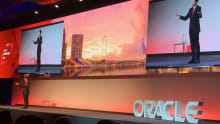AI-driven HCM is re-humanizing the way we work: Robert Lindsley, Oracle

Let’s Talk Talent Read similar articles

As organizations furiously digitalize themselves and as emerging technologies change the way we work, Artificial Intelligence (AI) will be at the forefront driving this change. AI will help organizations reimagine the entire workplace experience by creating personalized and on-the-go experiences for every user. The question then arises ̶ how can organizations implement cutting edge HCM technologies, not only by leveraging AI, but moving a step further to use adaptive intelligence ̶the intersection of human judgment and machine automation?
In an exclusive interaction with People Matters, Robert Lindsley, Director, Product Management, Oracle, on how organizations can leverage adaptive intelligence to up their game in HCM.
How is adaptive intelligence a step ahead of AI in terms of application in the HCM arena?
Oracle AI Apps for HCM is a suite of AI and data-driven features that helps HR professionals and employees, making work more human by making work smarter, simpler, and more agile. Recruiters benefit from AI and machine learning-driven candidate recommendations that reduce recruitment cycle time and cost-to-hire. This helps organizations improve retention and achieve business goals.
How exactly can organizations leverage adaptive intelligence to up their game in HCM? What are some of the advantages for organizations to switch to adaptive intelligence?
It’s simple for customers to take advantage of Oracle AI Apps for HCM. We embed AI directly in Oracle HCM Cloud so that our HR customers can apply ready-to-go machine learning to popular business processes. The advantages are dependent on the use case. For example, using Oracle AI Apps for Intelligent Payment Discounts in Oracle ERP Cloud enables an enterprise to optimize early payment discounts through data-driven recommendations around payment timing.
What are some of the challenges which organizations might face as they incorporate adaptive intelligence in their HCM systems?
Employers today are facing higher candidate and employee expectations than ever before.
Today's workers are looking for instant access, highly personalized content, and easy-to-use systems whenever and wherever they are. These demands are forcing HR professionals to rethink the way they approach the entire workplace experience. By leveraging AI technology for HR, organizations are better equipped to reimagine how HR services are delivered, simplify complex processing, and build a team of the best talent.
How do you see the role of HCM evolving in the workplace of time? What critical role will it play in shaping the future workplace?
AI-driven HCM is re-humanizing the way we work. It will help organizations reimagine the entire workplace experience by creating personalized and on-the-go experiences for every user, from candidates and recruiters to HR professionals, managers, and employees.
“HCM will also help bridge the tech gap between our personal and professional lives.”
In today’s society, technology and AI have completely infiltrated our personal lives. Because employees use these technologies every day at home, they are now expecting their employers to deliver the same type of experience at work, and that’s what Oracle HCM is helping HR to deliver.
Additionally, HCM that leverages emerging technologies allow us to access information anytime, anywhere. And by eliminating the work we don’t want to do, it creates more time to invest in emotional intelligence and form personal, human relationships.
This will enable the workforce to adapt by building more soft skills rather than the technical skills that technology can automate.
How can organizations ensure that they do not lose out the human touch while shifting to HCM solutions and adaptive intelligence?
“The human touch will always be present in HR.”
We don’t see machine learning replacing humans, but instead see it supplementing human potential and removing mundane and repetitive tasks, thereby making the workplace more human. There will still need to be humans in the loop, reviewing the work of AI and tweaking the algorithms to ensure they are generating the desired result. Humans will still need to make decisions but will spend less time sifting through data as AI will present them with recommendations they can either accept or decline.
(This article is based on an interaction with Robert Lindsley, Director, Product Management, Oracle in the background of Oracle OpenWorld Asia in Singapore. Click here to know more about the evolving role of HCM and the innovations in HR, powered by Oracle.)







